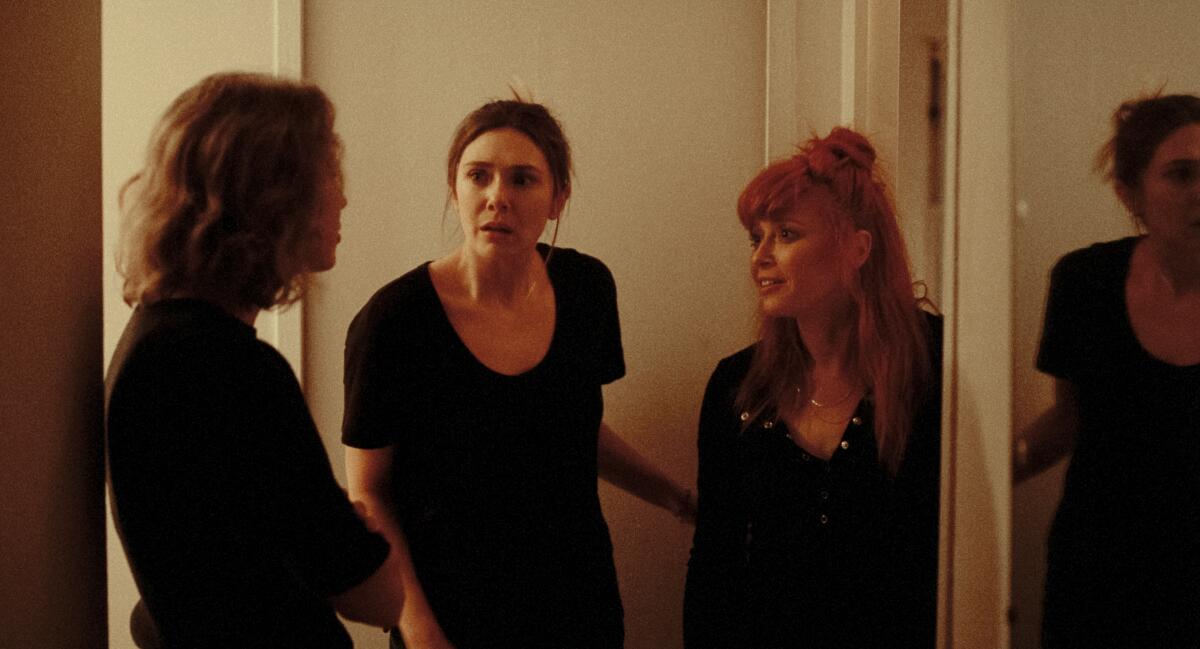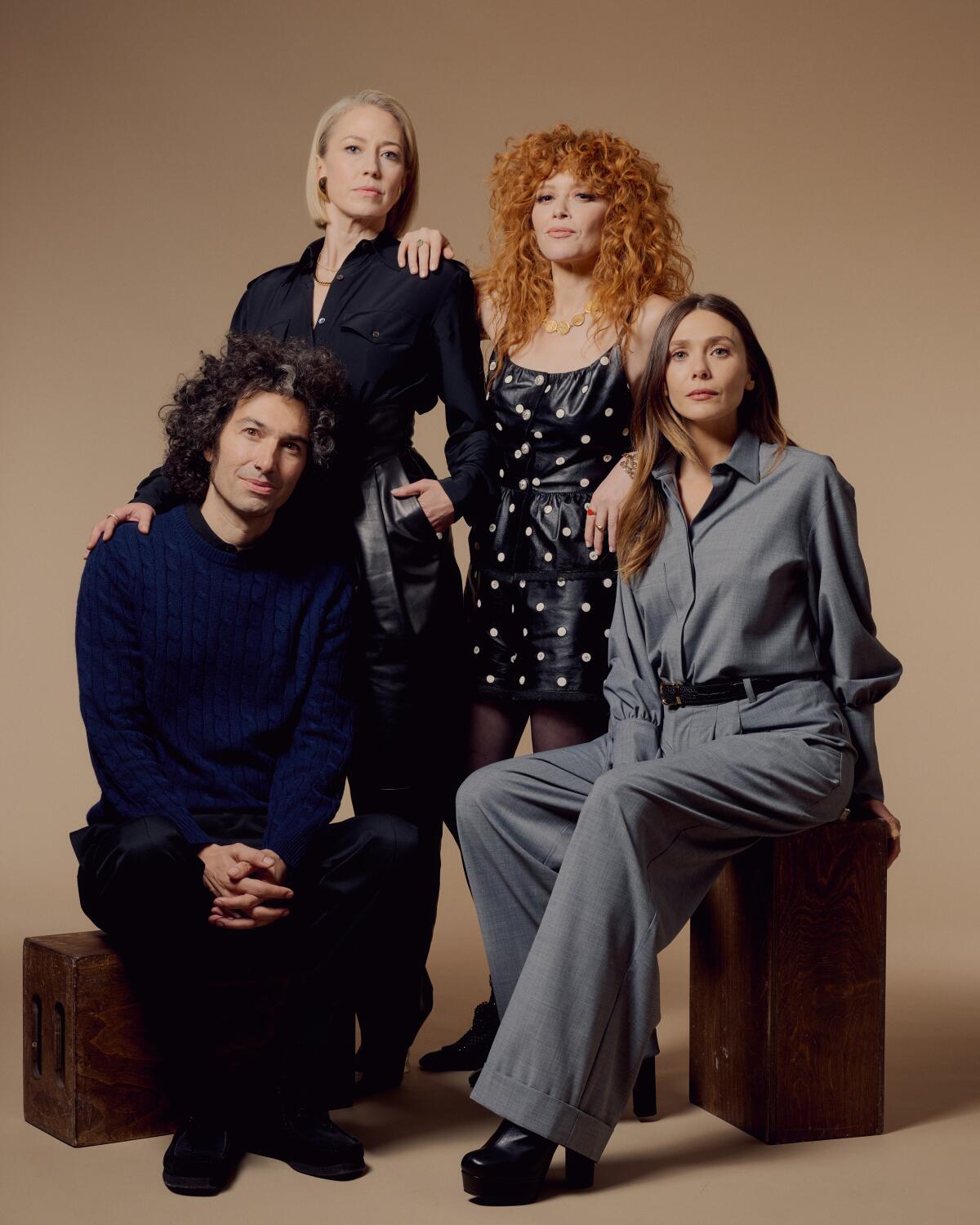Nothing brings people together like the death of a loved one. But then, nothing stirs up the little things, resentments, and lasting emotional bonds like the death of a loved one.
The new film “His Three Daughters” explores all of this in great detail and observation. Written and directed by Azazel Jacobs, the film follows three sisters — not far apart, but definitely not close — who reunite in a small New York apartment while their father is in hospice care.
The film leans heavily on the performances of Carrie Coon, Elizabeth Olsen and Natasha Lyonne, who all manage to bring an unexpected twist to their seemingly relatable onscreen characters. Kuhn’s intimidating Kathy, Olsen’s carefree Christina and Lyonne’s disaffected Rachel all show new sides to each other, but also to themselves, by the end of the story.
“It goes back to the whole ‘Breakfast Club,’ which is: How do you expect us to end up?” Jacobs says in a video interview from his apartment in New York. “‘I’m a dominant person, I’m a volatile person, I’m a silent smoker.’ And hopefully, by the end they’ve discovered something much more flawed and human than that.”
The film premiered at last year’s Toronto International Film Festival and was purchased by Netflix for $7 million. After a limited theatrical run, including some 35mm screenings, the film will arrive on the streaming platform on Friday.
Natasha Lyonne, left, Elizabeth Olsen and Carrie Coon in “Their Three Daughters.”
(Sam Levy/Netflix)
Jacobs wrote her script with these three actors in mind, knowing she had a connection with each and could bring the script to them directly. Jacobs worked with Olsen on episodes of Sorry for Your Loss. She met Coon after directing her husband, actor and playwright Tracy Letts, in his previous films The Lovers and The French Exit. She met Lyon after going with actor Lucas Hedges to Lyon’s 40th birthday party, a screening of The King of Comedy. The two later became friends on Instagram.
Although Coon knew Jacobs socially, he was still surprised to receive a script written with him in mind.
“I didn’t know what he thought of me as an actor, if he thought of me that way at all,” says Coon, recently nominated for an Emmy for his role in “The Golden Age.” “So when he explained to me that he had written the part, I was so happy. And of course Tracy said, ‘OK, you’re going to do it. ’ And that was before I even read it, because she loves Aza so much. I knew I was going to have a great time.”
When he read the script, Kuhn liked what he found.
“I often play with very verbal women,” Kuhn says. “And so, in a way, she was in my wheelhouse, as they say. And I am a big sister and I am stubborn and controlling and I think everyone should take my advice. And so, she is not far from me in this sense.”
For Olsen, Christina’s shy, recessive side felt far removed from her recent roles in the Love and Death series or as part of the Marvel Cinematic Universe at large.
“I don’t see myself as sweet and sensitive, but I am in a way, and Aza knows a lot about me and my daily life and things that I don’t share with a lot of people,” Olsen says. “And so finding something smaller inside of me and quieter, more vulnerable, felt like a good opportunity to me, although it was definitely something I wanted to do in the future. I got a chance to go to a softer place than I’m normally drawn to.”
As busy as he is as a producer, director, writer and showrunner on projects like Russian Doll and Poker Face, there’s still something satisfying for Lyon about doing someone else’s project; there just has to be. In his words, “like a Wilbury Traveling or something. I’m just a session musician here and the job is to serve the idea as best I can. I like being a part of watching someone do something.”

Carrie Coon, from left, Elizabeth Olsen and Natasha Lyonne in “Her Three Daughters.”
(Netflix)
Jacobs broke through with her third film, 2008’s Mother’s Man, starring her real-life parents, artist Flo Jacobs and avant-garde filmmaker Ken Jacobs, in their Tribeca loft, and there’s plenty to see her return to the story of family, aging and New York residency.
To find Jacobs’s specific apartment, she and her producer, costume designer Diaz Jacobs (also the director’s wife), handed out flyers on the street. She called people she hadn’t spoken to in years. She discovered the apartment they eventually shared through someone she’d known since she was a teenager. It’s a unit on the Lower East Side that was recently purchased, meaning it’s not fully furnished. Most importantly, the dividing wall, typically torn down by modern landlords, was still standing.
“It was important to me not to write about the artist’s loft,” Jacobs says. “I wanted this family to exist outside of my family. I grew up going to a lot of these houses. I knew about it from sleepovers or visiting friends. And it was very important to me to use the actual structure as a limitation.”
Jacobs and cinematographer Sam Levy, whose credits include “Frances Ha,” make the most of the limited space. In the early stages of the film, the three sisters appear only in single shots, separated from one another. Gradually, two of them may appear together in a shot, but it is not until the end of the film that all three actors appear onscreen together.
“The experience of the film reflects the sisters’ relationship,” says Kuhn. “Form meets function beautifully and in a way that is rarely done. You rarely see this level of craftsmanship in an industry that moves at breakneck speed to make money.”
The production used other apartments in the building as storage areas between takes, with Kuhn and Olsen in one and Lyonne in another to enhance her character’s sense of isolation. But the three still spent time together.
“It was wonderful to be on top of each other all the time and laugh and get into each other’s lives and then be invited on set and it was hard to deal with Aza because we’re so obsessed with everything. It’s who we are. Working together,” Olsen says. “I feel like in all the photos Aza took of us when we were off camera, I feel like our bodies were wrapped around each other. It created a different energy, like there’s no escape. You just have to deal with what’s real and what’s there.”
“We spent all our time walking up the stairs in the building,” Lyon said.

Director Azazel Jacobs, from left, Carrie Coon, Natasha Lyonne and Elizabeth Olsen in New York in August.
(Evelyn Freja / For The Times)
All three actors were impressed with the audience response to the film. The small independent film, which entered the festival without distribution a year ago, has consistently impressed audiences at screenings and is now a topic of discussion at awards shows.
“I’m really grateful that people are connecting,” Lyon says. “It’s absolutely true that I don’t think any of us expected it. It’s really something that we all need to remember, that it’s always a surprise. How nice to be affected by such surprises. It’s a reminder that when we get the green light or we read or we think, we make these strong decisions and we build these imaginary careers and ‘we must win at life.’ Well, spoiler alert, we die in the end.”
While Jacobs’ “Mother’s Man” was inspired by watching people her age give birth, and “The Lovers” by the wave of divorces surrounding her, “Her Three Daughters” was inspired by watching people her age lose their parents. Her parents are in poor health.
The film depicts the specific agony of the end of a lonely life: a sad period when there is nothing to do, and the smallest details (a signature on a piece of paper, what to eat for dinner) can have great meaning, because this is a task that can be done.
“That experience of waiting is what prompted me to write,” Jacobs says. “Time moves in the strangest way. As if suddenly every second counts. Email is not important. Everything else doesn’t matter, except this. Then you realize there’s a shift, suddenly email is important again and life outside of it is important. It’s something you didn’t want to happen, suddenly you resign yourself to it happening.”
“And that was really felt in those three acts,” Jacobs says. “That’s why it was so important for me to edit this film. I know there’s this comparison to plays, but the truth is we don’t see time moving at all like a play does. It could use time to make some things move quickly. Some things might move slowly, time might collapse. It doesn’t move like real time. And that’s how death feels to me.”
